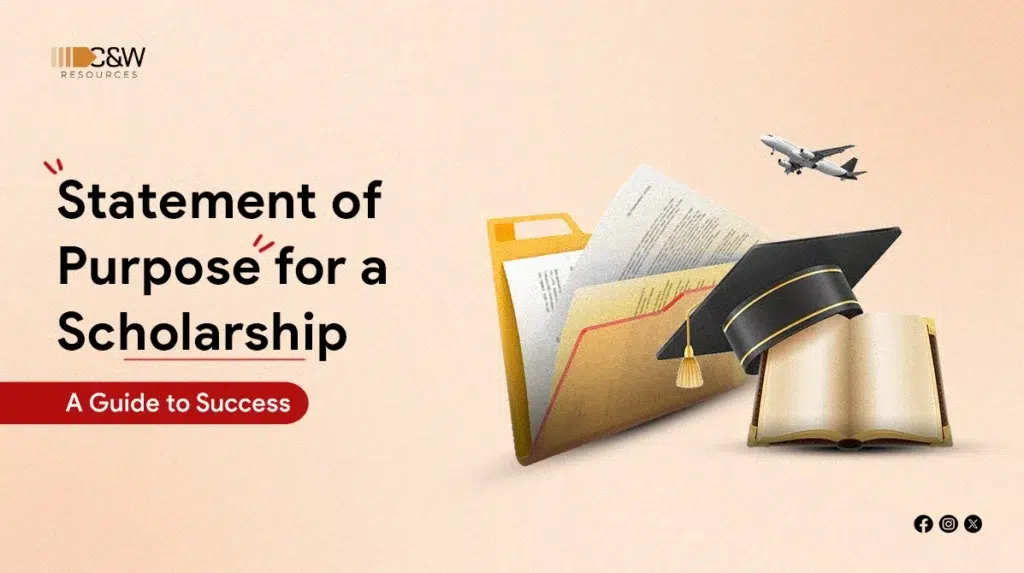
A Statement of Purpose (SOP) for a scholarship consists of personal statements and is required as part of the admission procedure of study abroad programs. It is not just a document; it’s an opportunity to be exceptional, to present your unique expertise and ambitions, and to leave a favorable impression. Prudent planning and introspection are necessary for crafting a compelling SOP. It is the only document to persuade the scholarship committee that you are the ideal and unique candidate for their support.
What should be included in the Statement of Purpose?
Crafting an effective Statement of Purpose (SOP) requires careful attention to various key components:
- Personal background
- Financial background
- Academic details
- Professional experience (full/part-time, voluntary)
- Immediate and long-term goals
- Reasons for selecting a specific institution
- Interest in the chosen field
- Extracurricular activities
- Published works, if applicable
- Submitted papers, if any
- Interests and hobbies
Let’s dig into the essentials to curate a strong and effective SOP to highlight your details.
Understanding the Purpose
The SOP serves several vital purposes:
Introduction to Self:
It introduces you beyond your academic distinctions—your vision, motivations, passions, and future goals.
Demonstration of Fit:
This section demonstrates why you are a perfect fit for the scholarship and how it relates to your scholarly and career progression.
Showcase of Skills and Accomplishments:
This section highlights your achievements, experiences, and skills relevant to the scholarship’s criteria.
Crafting Your Statement
1. Introduction
Start with a compelling introduction that grabs attention. It may include sharing a personal reminiscence, a turning point, or a brief journey overview. The statement to apply for the scholarship should be clear and should align with your goals.
For example, you could begin with: “I vividly remember the moment when my infatuation with ecological sustainability turned into a driving force for my academic and professional pursuits…”
2. Academic Background and Professional Experience
Detail your academic journey. Emphasize relevant courses, projects, and any noteworthy accomplishments. Discuss how these experiences have carved and strengthened your academic interests and career aspirations.
Describe specific courses or projects that have influenced your decision to apply for the scholarship. Highlight what you have achieved, including any industrial exposure, academic awards, honors, or distinctions you have received.
3. Career Goals
This is the most essential paragraph where you should outline your short and long-term goals. Your immediate goal would be to find where you want to work right after completing this course. Career objectives and how the scholarship will help you achieve them should be mentioned here. Be specific about the competencies or knowledge you hope to gain and how they contribute to your long-term goals.
For example, it may include your desire to work at the CEO/ CFO level or establish a business you own. You may also be interested in further studies, like a PhD degree program, which can be added here.
Connect your professional goals to your academic background and previous experiences. Explain how receiving the scholarship will benefit and enable you to pursue these goals more effectively.
4. Relevant Experience
In this section, discuss any relevant professional or extracurricular experiences. Highlight leadership roles, qualities, volunteer work, internships, or research projects demonstrating your distinctions and commitment.
Provide specific examples of how these experiences have made you confident about the scholarship and contributed to your growth, progress and development.
5. Impact and Contribution
Explain how receiving this scholarship will enable you to make a positive and profound impact. Articulate your vision for creating change in your community, study field or worldwide.
Discuss any initiatives, tasks or projects you have been involved in that have had a significant and lasting impact. Ensure your commitment to creating a greater good and explain how the scholarship will support your efforts.
6. Conclusion
Summarize your key points and reassert your enthusiasm for the scholarship. Relate to your introduction or leave the council with a powerful closing thought that reinforces and guarantees your candidacy.
For example: “As I look forward to the future with hope and expectation, I am zealous to leverage the opportunities provided by [Scholarship Name] to not only embrace my personal goals but also contribute significantly to the field of [Your Field] …”
Writing Tips
Be Specific:
Provide concrete examples and quantify accomplishments where possible.
Be Authentic:
Share genuine experiences and motivations.
Stay Focused:
Make sure that each paragraph supports your overall narrative.
Common Mistakes to Avoid
Generic Content:
Adjust each SOP to the specific scholarship and avoid ordinary templates.
Lack of Clarity:
Validate that your goals and intentions are clear and coherent.
Neglecting Guidelines:
Follow the scholarship guidelines instructions diligently, including word limits and formatting specifications.
Edit and refine your work.
Before you submit your statement of purpose, make sure you have followed all directions thoroughly and proofread carefully.
Final Thoughts
Your statement of purpose reflects your unique journey, ambitions, and potential. Devote the time to craft a captivating narrative that strikes a chord with the scholarship committee. Remember, this is your opportunity to excel and demonstrate why you deserve their investment in your future.
By sequencing these guidelines and investing effort into your SOP, you can maximize your chances of standing out among the competitors and securing the scholarship that will accelerate you toward your dreams. Good luck!
Introspection, clarity of purpose, and a strategic approach to effectively communicate your qualifications and aspirations are required to craft a scholarship statement of intent. Following the guidelines and incorporating your personal experiences and goals, you can create a persuasive SOP that sets you apart as a deserving candidate.
Recent Posts
- Studying Medicine in Hungary: Is It a Good Choice?
- Cheap Universities In Lithuania For International Students
- Study in Hungary Requirements for Bachelor’s, Master’s, and PhD Programs
- Admission Requirements for Study in France | Complete Guide
- The Best Courses To Study In UK For Masters: Complete Guide




